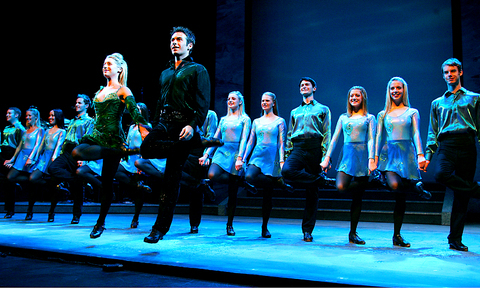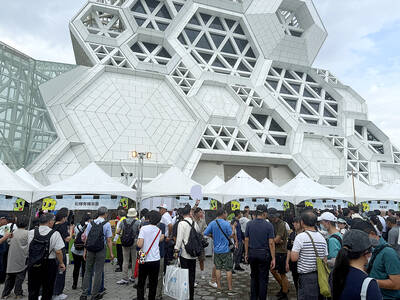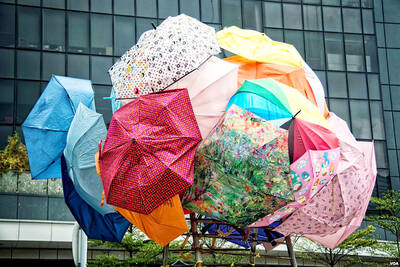Fans of Irish dance are in for a treat in the coming weeks when the "original" Irish dance ensemble, Riverdance makes its Taiwan debut and performs in Taipei, Taichung, Tainan and Kaohsiung.
Not to be confused with Michael Flatley's "other" foot tapping traditional Irish dance combo, the Lord of the Dance, which has paid numerous visits to Taiwan over the past three years, Riverdance was the first all Irish dance troupe to bring the Irish jig to mainstream audiences the world over.
Flatley's group was initially formed to perform at the 1994 Eurovision Song Contest in Dublin, but Riverdance actually proved more popular than many of contest's lackluster musical acts. Within a year the show that was choreographed to be a little more than a six-minute celebration of Irish culture that took to the stage in between acts had morphed into one of the most popular shows of all time.

Since Flatley quit Riverdance in 1995 the group and show have not only spawned numerous copycat acts, but have led to global interest in all things Irish. Riverdance has performed nearly 10,000 concerts, has played to packed houses in over 30 countries, and has netted merchandising sales in excess of US$35 million. And as if all that isn't enough to impress, then audience figures certainly should, as an estimated 2 billion people worldwide have seen the show.
The Riverdance troupe is no longer a single company. There are now three groups all of which take their names from Ireland's rivers. The Boyne tours in North America, the Avoca tours throughout Europe and the Corrib, which is named after the river that runs through the picturesque county of Galway, is tasked with keeping Asian audiences entertained.
While several local newspapers, a well-known singer and a rather un-Broadway savvy politician have recently been critical of touring groups that perform in Taiwan -- labeling the Really Useful Company that is set to bring Andrew Lloyd Webber's Phantom of the Opera to Taiwan early next year as "amateurs" -- Riverdance's Corrib troupe is a highly talented,
professional and handpicked unit.
And while only three of the lead roles are performed by genuine Irish dancers who were born and raised in the Land of the Blarney Stone organizers are not expecting this to hinder ticket sales or local audiences' enjoyment of the show.
What: Riverdance Live in Taiwan
Where and when: Thursday, Dec. 1 until Dec. 8 Taipei International Convention Center (台北國際會議中心); Dec. 10 and 11 Taichung Chunghsing University (台中中興大學); Dec. 12 and 13 Tainan City Cultural Center (台南市立文化中心); Dec. 15 through 17 Kaohsiung Chideh Hall (高雄至德堂).
Tickets: Tickets for Taipei shows cost from NT$800 to NT$4,800 and for performances in Koahsiung, Taichung and Tainan tickets cost from NT$600 to NT$3,600. Tickets for all performances are available from ERA ticketing outlets nationwide.

Water management is one of the most powerful forces shaping modern Taiwan’s landscapes and politics. Many of Taiwan’s township and county boundaries are defined by watersheds. The current course of the mighty Jhuoshuei River (濁水溪) was largely established by Japanese embankment building during the 1918-1923 period. Taoyuan is dotted with ponds constructed by settlers from China during the Qing period. Countless local civic actions have been driven by opposition to water projects. Last week something like 2,600mm of rain fell on southern Taiwan in seven days, peaking at over 2,800mm in Duona (多納) in Kaohsiung’s Maolin District (茂林), according to

It’s Aug. 8, Father’s Day in Taiwan. I asked a Chinese chatbot a simple question: “How is Father’s Day celebrated in Taiwan and China?” The answer was as ideological as it was unexpected. The AI said Taiwan is “a region” (地區) and “a province of China” (中國的省份). It then adopted the collective pronoun “we” to praise the holiday in the voice of the “Chinese government,” saying Father’s Day aligns with “core socialist values” of the “Chinese nation.” The chatbot was DeepSeek, the fastest growing app ever to reach 100 million users (in seven days!) and one of the world’s most advanced and

The latest edition of the Japan-Taiwan Fruit Festival took place in Kaohsiung on July 26 and 27. During the weekend, the dockside in front of the iconic Music Center was full of food stalls, and a stage welcomed performers. After the French-themed festival earlier in the summer, this is another example of Kaohsiung’s efforts to make the city more international. The event was originally initiated by the Japan-Taiwan Exchange Association in 2022. The goal was “to commemorate [the association’s] 50th anniversary and further strengthen the longstanding friendship between Japan and Taiwan,” says Kaohsiung Director-General of International Affairs Chang Yen-ching (張硯卿). “The first two editions

It was Christmas Eve 2024 and 19-year-old Chloe Cheung was lying in bed at home in Leeds when she found out the Chinese authorities had put a bounty on her head. As she scrolled through Instagram looking at festive songs, a stream of messages from old school friends started coming into her phone. Look at the news, they told her. Media outlets across east Asia were reporting that Cheung, who had just finished her A-levels, had been declared a threat to national security by officials in Hong Kong. There was an offer of HK$1m (NT$3.81 million) to anyone who could assist